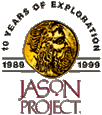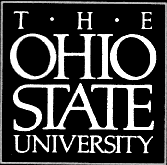 |
|||||
Great Lakes Sea Grant Extension Office
Educational Programs (K-12)
National Ocean Sciences Bowl.
The NOSB is a nationwide academic competition among teams of high
school students. Twenty-five separate regional competitions are held around
the U.S. in February with the final national competition held in April.
The NOSB tests students' math and science skills as applied to topics
on ocean (and Great Lakes) biology, chemistry, geology, physics, technology,
history, and economics. High school teams of four students, one alternate,
and a coach compete in 18 minute long rapid-fire question and answer matches
during the day-long round-robin, double elimination competition. GLERL's
Ann Arbor office coordinates and co-hosts the Great
Lakes Bowl, which is held at the University of Michigan. GLERL's Lake Michigan
Field Station in Muskegon, MI is host to the Fourth
Place winners of the National Competition.
Southeast Michigan Regional Science
Fair.
In conjunction with the annual Southeast Michigan Regional Science
Fair, GLERL sponsors awards for outstanding projects in aquatic science
in each of the Science Fair divisions: Senior Projects, Junior Projects,
and Junior Models and Collections. GLERL staff act as general science
fair judges as well as judges for the GLERL awards.
Partners for Excellence Program.
GLERL provides (1) mentors to help students with science fair projects,
(2) hands-on experience in our laboratory to science-oriented students
via participation in the Ann Arbor Schools Student Volunteer Program.
Interested sophomore students should contact their high school science
teacher or counselor for more information.
Undergraduate Education.
GLERL staff teach undergraduate classes at the University of Michigan,
Michigan State University, and Eastern Michigan University, hold adjunct
faculty positions, and provide tours of our facility to interested classes.
Graduate and Post-doctorate Education.
GLERL participates in the NRC post-doc program, and staff members
serve as graduate committee members or chairs.
Education Links
Ocean Explorer - Thunder Bay Sinkholes 2008
From July 2008 to July 2009, the Lake Huron Sinkhole project team will explore shallow and
deep coastal sinkholes in order to understand the chemical and physical properties that
contribute to the unique ecology found in these systems.
Great Lakes Water Data Sets for Teachers
In partnership with Eastern Michigan University we are working to make Great Lakes data
more accessible for teachers. These are real data extracted from on-going and historic
GLERL research projects. Each data set has been 'downscaled' (fewer decimal points, fewer
data points, fewer parameters) to facilitate use in the classroom. Students and teachers
can use the datasets to conduct their own inquiries, support guided inquiries, demonstrate
limnological concepts or just to practice graphing, mapping and mathematics.
GLERL's About Our Great Lakes
Also check out the following web sites for excellent information for
students, parents, and teachers interested in learning more about our
Great Lakes.
 |
TEACH
Great Lakes: Great Lakes Information Network: The TEACH site
features mini lessons on Great Lakes topics, such as environment,
history & culture, geography, pollution and careers & business.
Geared for elementary through high school students as well as teachers,
the modules are continually expanded and updated and include links
to a glossary to help explain scientific terms and acronyms. |
 |
The Great Lakes Atlas
is an Environmental Atlas and Resource Book written in easily understandable
language and contains fact sheets, photographs, and many colorful
maps and graphics. Topics include geology, hydrology, history, climate,
and lake processes. Writing a report for school? Check out this
book! This link takes you to the actual atlas, which is published
online in its entirety. |
 |
Jason
Project. In order to bring the thrill of discovery to millions
of students worldwide, Dr. Ballard, who discovered the wreck of
the RMS Titanic, founded the JASON Project, a year-round scientific
expedition designed to excite and engage students in science and
technology and to motivate and provide professional development
for teachers. |
 |
1998 was the Year of the Ocean. Visit the NOAA Year of the Ocean web site to learn more about the Earth's most precious resource! |
 |
The Ohio State University Stone Laboratory is a freshwater biological field station that offers custom-designed field trips, Aquatic Science Workshops for grades four through adult, and Summer Science Courses for college credit. |
Last updated: July 31, 2006 cmd


